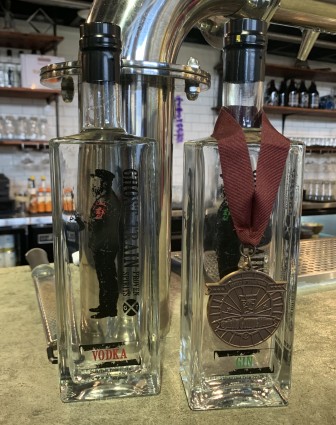Birmingham Gets Back to Distilling Liquor
The number of distilleries across the U.S. is on the rise. There are more than 1,500 active distillers nationwide, according to the American Craft Spirits Association. It’s a trend credited, by some, to the influx of breweries — a wave the Birmingham area has caught up with in recent years. But when it comes to spirits, a couple distillers in Birmingham are already on board.
The first thing to hit your nose on a tour of Birmingham’s Dread River Distilling Co. is the sweet smell of wheat grain. Mash tanks clank as they break down grains, wheat, and enzymes.
That’s where the fermentation process begins, turning sugar into alcohol.
John Cubelic is co-founder of Dread River, where they distill whisky, vodka, gin and rum. They also make small batch wine and craft beer. The 24,000 square foot distillery is one of the largest in the state. Cubelic says when they started planning for Dread River three years ago, they wanted to bring something different to Birmingham’s food and beverage scene.
“Distilled spirits was a white space opportunity,” Cubelic says. “No one had really taken that challenge on locally, and to this scale not in Alabama at all.”
In 2015, Redmont Distilling Co. became the first distillery in Birmingham since prohibition, according to the city. Redmont distilled its own vodka and gin until the end of 2017. After a year-long hiatus, officials with Redmont recently announced they’re rebranding themselves with a new owner, former NBA and Auburn University basketball player Charles Barkley.
Distillation isn’t cheap. The founders of Dread River invested more than $3 million in the project, which offers a tasting room, kitchen and bar area with velvet couches.
“The distilled spirits industry supports about 8,400 jobs in the state of Alabama and contributes about $742 million to the state’s overall gross domestic product,” says Jeff Traywick, vice president for economic development at the Birmingham Business Alliance.
Traywick says beer brewers were the first in Alabama to push for easing of statewide alcohol restrictions and local breweries are now branching out into spirits. When Ghost Train Brewing Company opened three years ago, the founders were completely focused on beer; they had no intention of distilling liquor. But Will Crenshaw, Ghost Train’s director of operations, says they are now making their own vodka and gin.
“Distillation is a pretty small part of what we do, but we have some very well crafted cocktails on the menu,” Crenshaw says. “It’s a nice alternative for those who either have gluten sensitivities or just prefer spirits over beer.”
Crenshaw, who is also Ghost Train’s head distiller, says distilling liquor at a brewery isn’t far fetched. He says ingredients such as dry orange peel and coriander are already on hand for wheat beers. Their biggest challenge, he says, was packaging.
“Getting bottles was the thing that took the most time,” Crenshaw says.
Ghost Train isn’t the only brewery riding the distillation wave. Ferus Ales will open in Trussville this month and plans to distill liquor in the near future.
Traywick sees at as the Birmingham area getting back to its roots.
“Our area’s got a pretty long ranging history not only with brewing, but also with distillation,” he says. “Jack Daniels even relocated their operations to Birmingham and distilled their product here from 1913 to 1915.”
Some people call the 1910’s “the good ol’ moonshine days.” In 1919, Congress passed the Volstead Act, which prohibited the sale of alcohol in the U.S. The resurgence of distilleries in Alabama is another way the state is repeating its history, but unlike the early 20th century, many people aren’t complaining about it.
Bill making the Public Service Commission an appointed board is dead for the session
Usually when discussing legislative action, the focus is on what's moving forward. But plenty of bills in a legislature stall or even die. Leaders in the Alabama legislature say a bill involving the Public Service Commission is dead for the session. We get details on that from Todd Stacy, host of Capitol Journal on Alabama Public Television.
My doctor keeps focusing on my weight. What other health metrics matter more?
Our Real Talk with a Doc columnist explains how to push back if your doctor's obsessed with weight loss. And what other health metrics matter more instead.
Baz Luhrmann will make you fall in love with Elvis Presley
The new movie is made up of footage originally shot in the early 1970s, which Luhrmann found in storage in a Kansas salt mine.
Forget the State of the Union. What’s the state of your quiz score?
What's the state of your union, quiz-wise? Find out!
A team of midlife cheerleaders in Ukraine refuses to let war defeat them
Ukrainian women in their 50s and 60s say they've embraced cheerleading as a way to cope with the extreme stress and anxiety of four years of Russia's full-scale invasion.
As the U.S. celebrates its 250th birthday, many Latinos question whether they belong
Many U.S.-born Latinos feel afraid and anxious amid the political rhetoric. Still, others wouldn't miss celebrating their country








